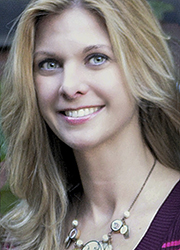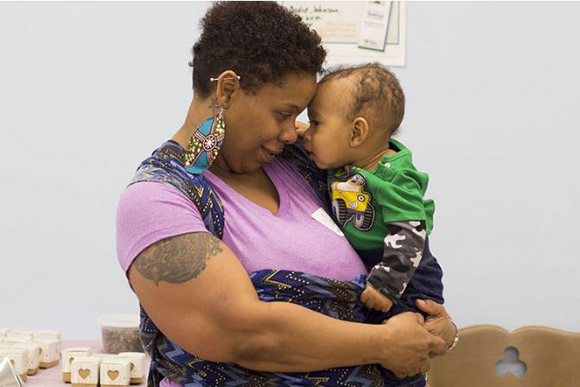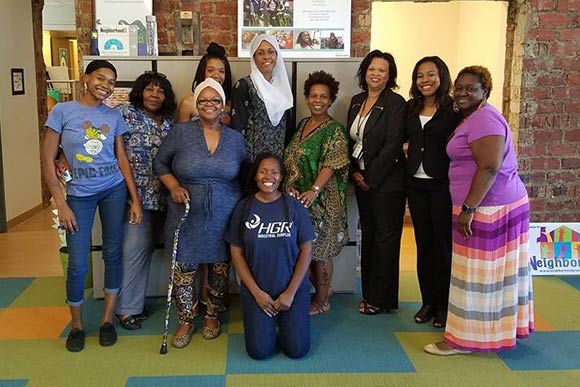Birthing Beautiful Communities educates, advocates and supports
This series of stories, "Grassroots Success: Awakening the Power of Families and Neighborhoods," explores how meaningful impact on our communities grows from the ground up. Support for "Grassroots Success" is provided by Neighborhood Connections and NewBridge Cleveland Center for Arts & Technology.
An overwhelming number of babies are dying in Cleveland neighborhoods, and a group of strong women have come forward to prevent those deaths through education, advocacy and support.
According to Birthing Beautiful Communities, 22 babies in Hough die for every 1,000 born, which is a stark contrast to the national average of six. Meanwhile in Cleveland's Central neighborhood, approximately 30 babies die annually.
“Infant mortality is not a new problem,” Birthing Beautiful Communities founder Christin Farmer says. “We’ve always known that our babies die at a higher rate and maternal morbidity rates are high amongst African American woman too.”
She blames the disparity on racism. Understandably so, as infant mortality rates are three times higher for black babies than white.
“A lot of the supportive services we provide have to do with us having to attend appointments with the mothers because they’ve been treated unfairly," says Farmer. "They don’t want to receive care or assistance out of fear of being judged because this is their third or fourth child.
"There’s a lack of wealth within communities, and education and achievement gaps in communities," she continues. "These are all day-to-day stressors that African-Americans face. Also, when you look as mass incarceration rates within communities—the men in the community are being incarcerated at a much higher rate—and that’s leaving women to take care of the babies and the children by themselves, and that is a stressor. It boils down to institutional and structural racism.”
Farmer formed Birthing Beautiful Communities in 2014 to combat these alarming realities and resulting statistics. She had previously studied to be a midwife and volunteered as a postpartum doula. Upon deciding on birthwork as her career path, she began seeking out other African American doulas in the area.
"I became acquainted with a few other woman and we began to form a little commune of birthworkers who were interested in supporting moms in our own communities where we live and decreasing the rates of infant deaths,” notes Farmer, adding that the volunteers started out by meeting weekly and garnering clients through referrals.
“More so than doula work, we began to connect them [our clients] to a lot of other support services that they needed,” she says. “We did a lot of navigation with them, helping them through a lot of issues pertaining to housing, social service and caseworkers. By the time we get to the labor and delivery room, it’s a little too late if we don’t provide support beforehand.
"What we found was that the women really lacked support through family, through friends, and they a lot of times lived in isolation… Women not having support around them during their pregnancy can cause stress. Stress can lead to prematurity, and prematurity is the leading cause of infant mortality.”
Birthing Beautiful Communities provides free services to local women including childbirth and parenting education with workshops and classes on breastfeeding, stress relief, bonding with baby, co-parenting and healthy eating. They also offer support for labor, delivery and postpartum health including depression. Other issues they assist with include infant loss, anxiety, panic or fear. They also advise in family, life and goal planning.
“Our focus is always on what is going on in this mother’s life,” Farmer says. “We make it mandatory for anyone who comes through our door to participate in our SOS circle, which is all about mental health and emotional trauma—we work with a psychologist on that. We have our birthworkers facilitate these circles. They’ve been largely successful because they really hit at the core," she adds, noting that some of the clients don't even realize they are being exposed to stressors because it’s just their norm.
"It’s not normal to not know where your next meal is coming from or where you’re going to sleep that night or why you have these sorts of feelings, so we have that family support structure among ourselves where we can help in such circumstances," says Farmer, adding that the group promotes healthy eating, breastfeeding, and togetherness. "It’s collectivism that has left our communities so we’re just bringing it back. We’re building communities through babies.”
The organization also trains women to provide these services through an eight-week course on prenatal, birth, and postpartum support; breastfeeding; contraception; and stress, anxiety, depression and panic support. All birthworkers are required to obtain CPR credentials. The infant CPR classes are open to the public.
They are currently training their second class of women. The first class had nine trainees; the current class has 10. The group is planning to offer community birthworker training once a year that would include doula training in addition to training on the many other services they provide. Birthing Beautiful Communities aims to eventually hire those graduates. Beginning in April, the organization will also offering a course for doula-only training (labor, delivery and postpartum support).
“We don’t turn anyone away and we have never charged anyone anything,” Farmer says of the training, which is valued at $1,800. “Since we’re paying for the training, we expect our trainees to come back and take on one or two pro-bono cases so that we can accommodate those woman who live outside of our scope but still need the services.”
The Cleveland Foundation awarded the Greater University Circle Community Health Initiative (GUCCHI) $500,000 in April 2015, $125,000 of which went to Birthing Beautiful Communities to provide their services in the Hough neighborhood.
“Christin Farmer was the first person to inform me about the infant mortality crisis in 2014. I knew nothing of it,” GUCCHI project manager Neal Hodges says. “What Christin was doing was addressing the social determinants that play a part in the infant mortality crisis by training Glenville residents to become doulas to then help Glenville women who were pregnant and facing challenging situations to help ensure they would have a healthy, live birth."
He continues: "We started a marketing campaign in the communities as it became apparent that the community was unaware they were in the middle of a crisis (infant mortality) that rivals third world countries." The effort, however, does not stop with women.
“We are creating a Dude-la experiment program to address infant mortality from a two-parent approach,” says Hodges. “Most often—and rightfully so—infant mortality is geared toward the mother but not the farther. We aim to change that, and we are partnering with 100 Black Men and Cuyahoga County Fatherhood Initiative to support the concept.”
In addition, Ohio Medicaid funds Birthing Beautiful Communities in neighborhoods outside of Hough deemed at high risk for infant mortality including Central, Buckeye-Woodhill, Ohio City and Lee-Harvard.
So far, the nine-person staff, which includes seven birthworkers, has assisted close to 50 women and is currently serving 23 pregnant mothers and three postpartum mothers. They have not suffered any deaths.
“Because we hire the women that we train, we are a workforce development agency, and we integrate the practice of birthwork with community development,” Farmer says. “It’s where community wealth meets community health.”



